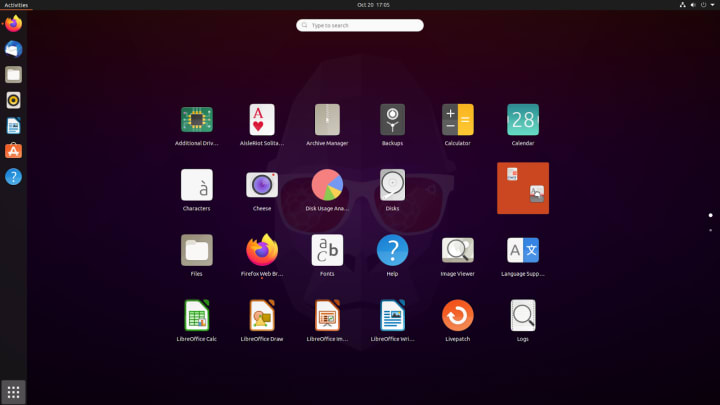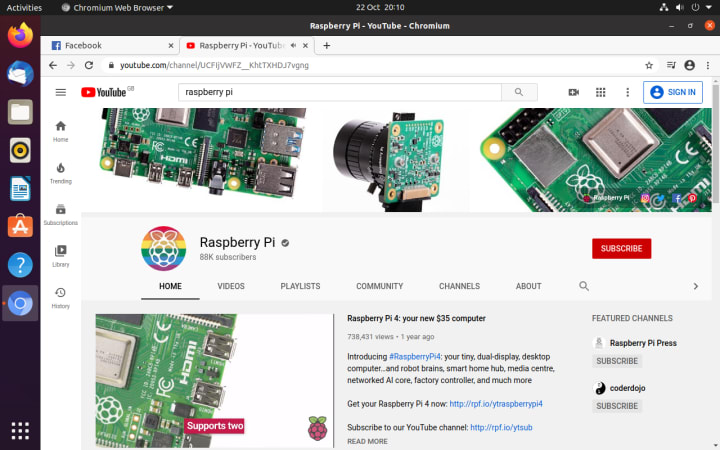Ubuntu 20.10 on Raspberry Pi delivers the full Linux desktop and micro clouds
Canonical
on 22 October 2020
Tags: LXD , micro cloud , Raspberry Pi , sc:snap:microk8s , Ubuntu 20.10

22nd October 2020: Canonical today released Ubuntu 20.10 with optimised Raspberry Pi images for desktop in support of learners, inventors, educators and entrepreneurs, bringing the world’s most open platform to the world’s most accessible hardware.
“In this release, we celebrate the Raspberry Pi Foundation’s commitment to put open computing in the hands of people all over the world,” said Mark Shuttleworth, CEO at Canonical. “We are honoured to support that initiative by optimising Ubuntu on the Raspberry Pi, whether for personal use, educational purposes or as a foundation for their next business venture.”
The Raspberry Pi 2, 3, and 4 join a very long list of x86 and ARM devices certified with Ubuntu, the operating system (OS) best known for its public cloud and desktop offerings. Dell, HP and Lenovo all certify PCs with Ubuntu Desktop, which is also the most widely used OS on the AWS, Microsoft Azure, Google, IBM and Oracle clouds.
Ubuntu 20.10 also includes LXD 4.6 and MicroK8s 1.19 for resilient micro clouds, small clusters of servers providing VMs and Kubernetes on demand at the edge, for remote office, branch office, warehouse and distribution oriented infrastructure.
Ubuntu Desktop 20.10
On top of Raspberry Pi desktop support, Ubuntu 20.10 includes GNOME 3.38, which tweaks the apps grid, removes the frequents tab and allows apps to be ordered and organised however users prefer. The battery percentage display toggle has been exposed in power settings, private WiFi hotspots can be shared using uniquely generated QR codes and a restart option has been added to the status menu next to logout/power off.
The 20.10 desktop sees added support for Ubuntu Certified devices. More Ubuntu workstations now receive biometric identification support out of the box. 2-in-1 devices with on screen keyboards are now fully supported enabling an improved Ubuntu experience on devices including the Dell XPS 2-in-1 and Lenovo Yoga.

Raspberry Pi models with 4GB or 8GB RAM gain full support for the Ubuntu Desktop. “From the classic Raspberry Pi board to the industrial grade Compute Module, this first step to an Ubuntu LTS on Raspberry Pi with long term support and security updates matches our commitment to widen access to the very best computing and open source capabilities” said Eben Upton, CEO of Raspberry Pi Trading.

Introducing micro clouds
Micro clouds are a new class of infrastructure for on-demand compute at the edge. Micro clouds are distributed, minimal and come in small to extremely large scale. In Ubuntu 20.10, Canonical introduces its micro cloud stack that combines MAAS, LXD, MicroK8s and Ceph on Ubuntu, to deliver resilient pocket clouds hardened for mission-critical workloads in 5G RANs, industry 4.0 factories, V2X infrastructures, smart cities and health care facilities.
On a Raspberry Pi, users can start with MicroK8s, to orchestrate highly available workloads at the edge or with LXD to build a home lab appliance using LXD’s clustering and virtual machine management capabilities. The Ubuntu 20.10 release introduces users a way to experiment, test, or develop with full cloud capabilities through the Raspberry Pi. With Ubuntu 20.10 on a Raspberry Pi, anything is possible, from robotics to AI/ML.

Ubuntu 20.10 will be available to download here.
To learn more about Ubuntu 20.10 on the Raspberry Pi, click here to join the live stream at 5PM (BST) on Friday 23rd October 2020.
For more on what is new in Ubuntu 20.10 in the data centre, including Ubuntu Server, Charmed OpenStack, MAAS and Charmed OpenStack, register for the webinar on November 4th 2020.
<Ends>
About Canonical
Canonical is the publisher of Ubuntu, the OS for most public cloud workloads as well as the emerging categories of smart gateways, self-driving cars and advanced robots. Canonical provides enterprise security, support and services to commercial users of Ubuntu. Established in 2004, Canonical is a privately held company.
Fast, dense, and secure container and VM management at any scale
LXD brings flexible resource limits, advanced snapshot and networking support, and better security — all making for easier, leaner and more robust containerised solutions and VMs.
Newsletter signup
Related posts
Generating allow-lists with DNS monitoring on LXD
Allow-listing web traffic – blocking all web traffic that has not been pre-approved – is a common practice in highly sensitive environments. It is also a...
Native integration available for Dell PowerFlex and Canonical LXD
The integration delivers reliable, cost-effective virtualization for modern IT infrastructure Canonical, the company behind Ubuntu, has collaborated with...
Native integration now available for Pure Storage and Canonical LXD
Canonical, the company behind Ubuntu, and Pure Storage, the IT pioneer delivering enterprise-grade all-flash storage, have partnered to introduce a native...
